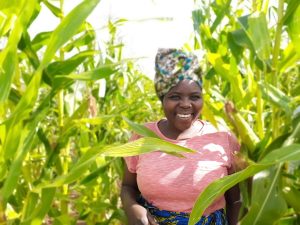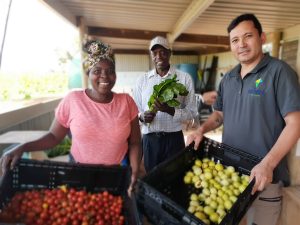African garden in the heart of Mildura
With a colourful head-wrap protecting her from the early afternoon sun, Joselyne Majambere is harvesting maize in a verdant paddock.
The cob-grown grain is a staple in her native Burundi but almost impossible to buy commercially in Australia.
Joselyne is part of a remarkable not-for-profit co-op project based in Mildura, in north-west Victoria, that is seeing sixty or so mostly African refugees grow traditional foods.
“We come here to grow the foods we are used eating. It’s good for us. We come together and grow food together in the way we used to in our homelands,” Joselyne says.
“We grow the food organically and in a sustainable way.”
 Food Next Door matches under-utilised farmland with landless farmers to support small-scale regenerative farming, growing diverse crops while also engaging people from diverse backgrounds to supply food to local households.
Food Next Door matches under-utilised farmland with landless farmers to support small-scale regenerative farming, growing diverse crops while also engaging people from diverse backgrounds to supply food to local households.
On the five acre plot, east of the town centre, there are farmers from Burundi, The Congo, Zimbabwe and Kenya at work.
Each farmer has a small plot on which they grow maize as well as okra, beans, eggplant, turmeric, chard, beetroot, carrots, onions, peas, sugar cane, peanuts and more. They are even attempting to grow bananas.
The co-op, which is a partnership with the local multicultural organisation the Sunraysia Mallee Ethnic communities Council (SMECC), also supplies fresh food to the local ‘Food Hub’ charity which distributes to disadvantaged local families as well as to a business called ‘Out of the Box’, which seels the produce online to local families.
 Food Next Door Executive Officer Shingirai Nyabonda said the initiative started five years ago when local woman Jennifer Douglas donated the land and her irrigation water allocation.
Food Next Door Executive Officer Shingirai Nyabonda said the initiative started five years ago when local woman Jennifer Douglas donated the land and her irrigation water allocation.
Mr Nyabonda said about a quarter of farmland in the Mildura region is unused or underused.
“Our aim is to give refugees and newly arrived migrants access to land and the ability to grow food,” he said.
“Some of these people are suffering trauma or distress after being removed from the life they knew.
“We’re working to support these groups to re-engage in small-scale farming and grow food, including their traditional foods. At the same time, it boosts their opportunities to become a part of the community and forge links into the wider community.
“Australia’s land and the way we farm is different to what they are used to. So, we train the farmers in managing our soil, Australian seasons, water allocations and farming techniques, and try to improve the soil without the use of chemicals.
“By engaging people from diverse backgrounds to grow and share the food they love, they can introduce and supply new ingredients to local Mildura households.
“The farmer and the community can be self-sufficient, growing clean, fresh produce on small farms, helping to secure the local food cycle.
“Plus for many of the families we work with, growing their own food is much cheaper,” Mr Nyabonda said.
He said most of Food Next Door’s farmers were from Africa but the scheme was open to anyone.
“It’s really a community. Everyone has their own plot but we come together at planting and harvest times to work communally. And we hold events frequently, such as our maize barbecues.
“We concentrate on small scale production of food that is not available in the normal food system,” he said.
Mr Nyabonda said the project planned to expand to include people from South East Asian countries.
“We want to expand because there are people in Mildura from South East Asia who want to grow their traditional foods.
Find out more about Food Next Door here: Home – Food Next Door Co-Op












